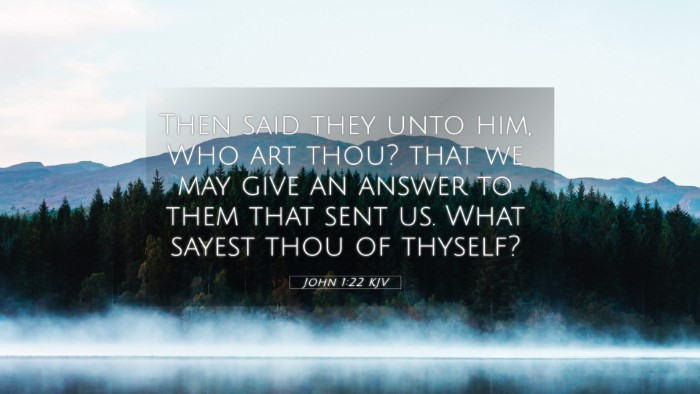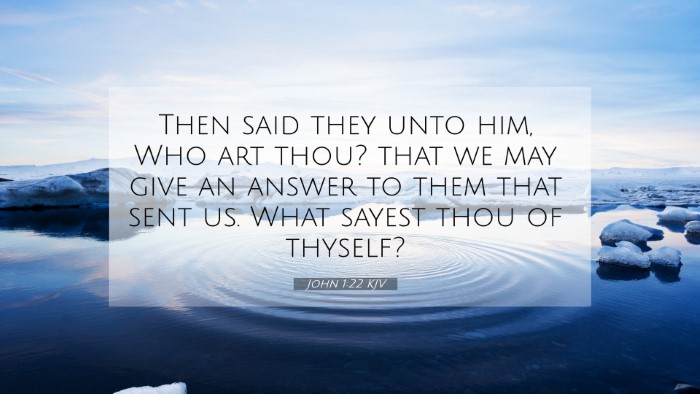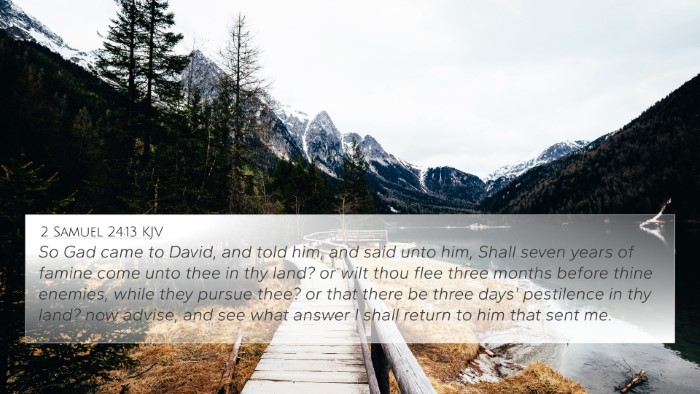Understanding John 1:22
John 1:22 states: "Then said they unto him, Who art thou? That we may give an answer to them that sent us. What sayest thou of thyself?" This passage showcases a moment of inquiry directed towards John the Baptist, as religious leaders seek to establish his identity and purpose.
Insights from Public Domain Commentaries
The following insights are derived from respected public domain commentaries, providing clarity and depth to the understanding of this verse:
- Matthew Henry: Henry emphasizes the significance of the inquiry into John's identity as a precursor to understanding Christ's ministry. He suggests that the leaders' questions reflect a broader desire for divine revelation and guidance.
- Albert Barnes: Barnes notes the contrasting roles of John and Jesus, highlighting that John came to bear witness rather than to be the Light himself. This verse positions John as a significant figure pointing towards the greater truth of Christ.
- Adam Clarke: Clarke explains the urgency of the questioning by the priests and Levites, as they were tasked with the religious oversight of the people. Understanding John's role was crucial to them, as they sought validation of their authority.
Contextual Significance
The inquisition posed to John the Baptist can be understood within the larger narrative of John’s Gospel, where the concept of witness and testimony is pivotal. The door is opened for exploration of other Scriptures...
Related Bible Cross-References
When analyzing John 1:22, we can draw parallels to several key scriptural references that enrich our understanding:
- John 1:6-8: These verses introduce John the Baptist's mission to testify about the Light.
- Matthew 3:14-15: A further discussion about John's reluctance to baptize Jesus, noting the significance of humility in Christian service.
- Luke 7:28: Jesus speaks of John the Baptist, affirming his role as a prophet and greater than any born of women.
- Isaiah 40:3: A prophetic statement regarding the voice in the wilderness, announcing the coming of the Lord.
- John 3:30: John’s own declaration that "He must increase, but I must decrease," encapsulating his humility.
- Acts 19:4: Paul referring to John's baptism and its spiritual implications in relation to Jesus's ministry.
- Matthew 11:11: Jesus commenting on the greatness of John, establishing his authoritative prophetic role.
Exploring Thematic Connections
Connecting John 1:22 with other scriptures offers deeper insights into themes of humility, identity, and the nature of prophetic witness. We will look at:
- Thematic Bible verse connections: The recognition of John's acknowledgment of his role within God's overarching plan.
- Linking Bible scriptures: The echoing role of John throughout both the Gospels and the prophetic literature of the Old Testament.
- Inter-Biblical dialogue: Understanding how John's question to Jesus reflects the broader quest for truth and revelation present throughout Scripture.
Tools for Understanding and Cross-Referencing
For those engaging in deeper study, utilizing tools for Bible cross-referencing can yield rich insights:
- Bible concordance: A valuable asset for locating specific themes and reference points within the Scriptures.
- Bible cross-reference system: Integrating cross-reference guides can clarify connections between verses.
- Bible reference resources: Providing historical context and interpretations that enhance understanding of passages.
Conclusion
John 1:22 invites readers into a vital discourse on identity, purpose, and prophecy. Engaging with a variety of scriptural cross-references allows for a multifaceted interpretation that enriches personal faith and communal understanding.



